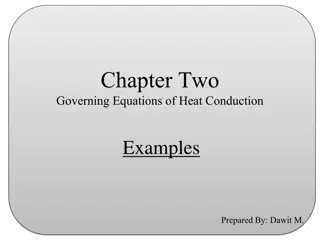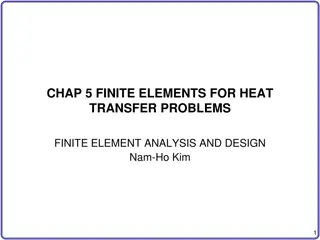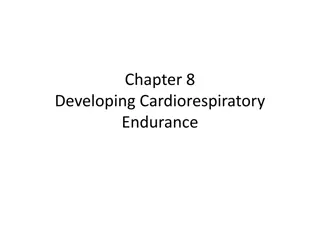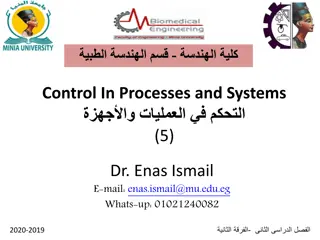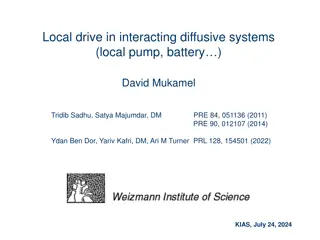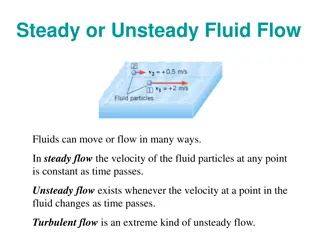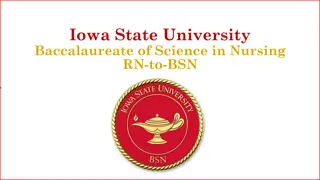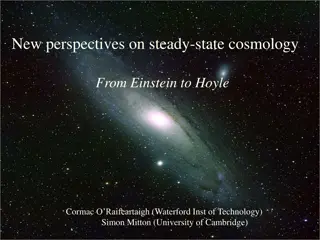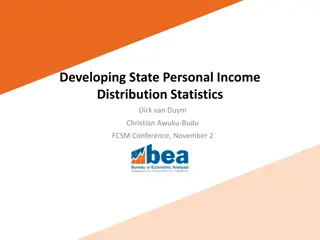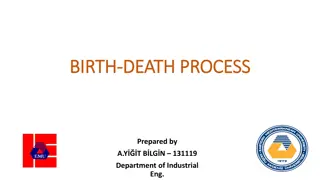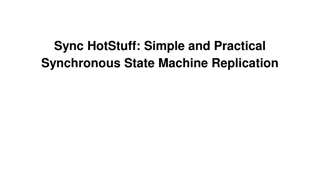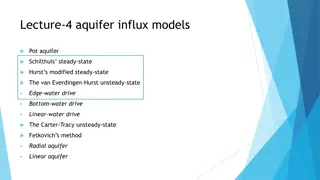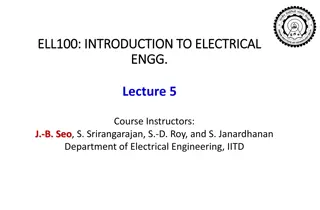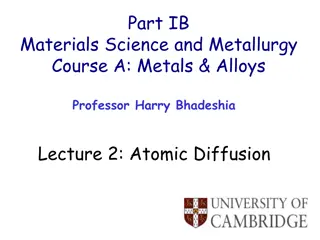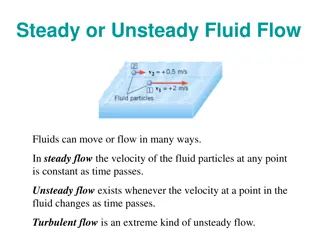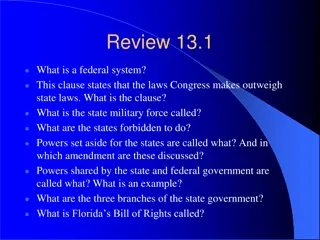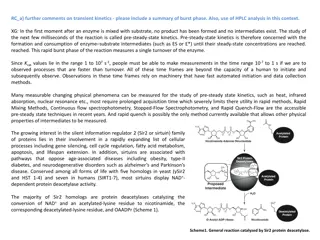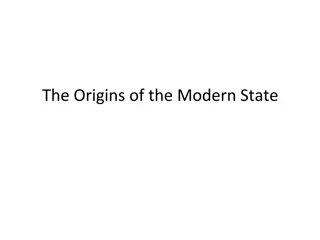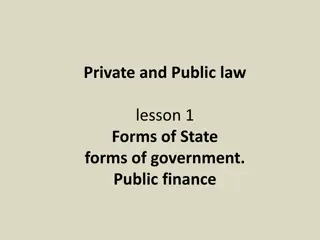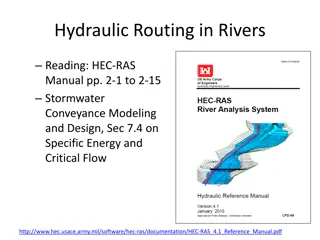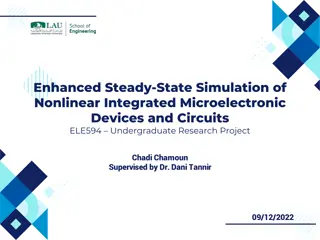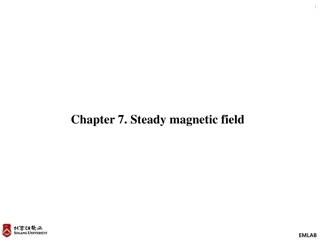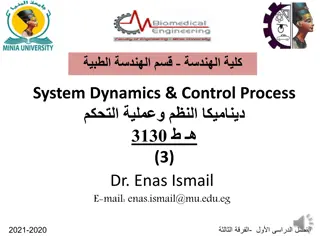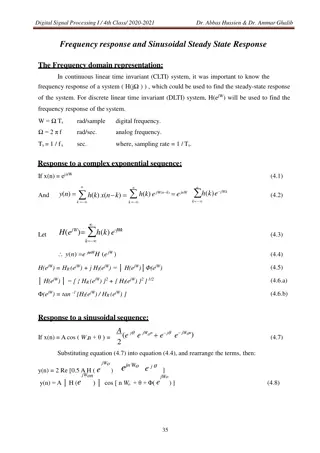Pharmacokinetics Lecture: Clinical Applications and Dosage Regimens
Explore the pharmacokinetics lecture focusing on clinical implications such as changes in drug half-life in various patient conditions. Learn about dosage regimen design and optimization, including considerations for achieving therapeutic drug levels. Discover clinical situations requiring dosage ad
4 views • 53 slides
Chapter Two Governing Equations of Heat Conduction
This compilation covers examples and governing equations of heat conduction, including boundary conditions and scenarios involving one-dimensional conduction in various structures. It explores scenarios like steady-state conditions in a plane wall, heat conduction along a pipeline, and temperature d
0 views • 12 slides
Finite Element Analysis of Heat Transfer Problems
Analogy between stress analysis and heat conduction analysis is discussed. Various thermal problems, including steady-state heat transfer and governing differential equations, are explored. Conservation of energy and boundary conditions are detailed for solving thermal analysis problems.
0 views • 35 slides
Enhancing Cardiorespiratory Endurance Training Techniques
Dive into Chapter 8 focusing on Developing Cardiorespiratory Endurance. Explore important vocabulary, cardiorespiratory fitness tests, alternate evaluations, and aerobic activities. Learn about various tests, such as the Steady-State Walk Test and Cooper's 1.5 Mile Run Test, to assess and improve en
0 views • 7 slides
The Principles of Water Bath Heaters for Efficient Heating
Water bath heaters provide a steady water temperature using a fast-acting system and are efficient in fuel gas usage. The principle involves obtaining gas temperature by mixing hot and cold gas and regulating the mixing ratio accurately. The bypass valve controls the gas flow, either passing through
3 views • 4 slides
Time Domain Dynamic Responses in Control Systems
In the field of control systems, analyzing time domain dynamic responses is essential for evaluating system performance. This involves studying transient and steady-state responses, as well as characteristics such as steady-state error. By examining these responses to standard input signals, insight
5 views • 30 slides
Local Drive in Interacting Diffusive Systems: Effects of a Pump on Steady State Properties
Driven systems exhibit long-range correlations in their steady state, contrasting equilibrium systems where particles are only locally correlated. This discussion focuses on the impact of a local drive (pump) in a diffusive fluid on its steady state properties, particularly at criticality. The study
0 views • 44 slides
Fundamentals of Fluid Flow: Steady, Unsteady, Compressible, Incompressible, Viscous, Nonviscous
Fluid flow characteristics such as steady vs. unsteady, compressible vs. incompressible, and viscous vs. nonviscous play crucial roles in understanding how fluids behave in various scenarios. Steady flow entails constant velocities over time, while unsteady flow involves changing velocities. Liquids
2 views • 11 slides
Program Outcomes & Evaluation of Iowa State University BSN Program
Iowa State University's Baccalaureate of Science in Nursing RN-to-BSN program shows excellent outcomes with high completion rates, steady enrollment, and positive alumni feedback. Graduates report high satisfaction levels, employment as RNs, and career advancement opportunities post-BSN completion.
0 views • 8 slides
Revisiting Steady-State Cosmology: From Einstein to Hoyle
Explore the historical evolution of cosmological models from Einstein's steady-state theory to the Big Bang hypothesis, examining key figures, discoveries such as Hubble's law, and debates about the universe's expansion. The article delves into Einstein's contributions, the challenges of integrating
0 views • 18 slides
Advancements in Dye-Sensitized Photoelectrochemical Cells
History traces the development of photoelectrochemical cells since 1972, highlighting the progress, challenges, and state-of-the-art dyes used, with an emphasis on improving performance through innovative solutions like Al2O3 layers. Key issues such as dye degradation and electron-hole recombination
0 views • 15 slides
Developing State Personal Income Distribution Statistics
This project aims to create a distributional account for State Personal Income, allowing for the analysis of inequality by state and over time. Using various data sources such as BEA aggregates and IRS statistics, the distributional model provides insights into state-level income inequality. Census
1 views • 17 slides
Pure Birth Processes in Industrial Engineering
Birth-death processes, Yule-Furry models, and pure birth processes are discussed in the context of industrial engineering. The study of evolutionary processes, population dynamics, and radioactive transmutations are explored through mathematical models and examples. The concept of state transitions
0 views • 19 slides
The Origin and Evolution of the Universe
Debate in medieval philosophy over the universe's past, Kepler's finite universe theory, Newton's motion principles, and Poe's "Primordial Particle" concept. The Big Bang theory by Georges Lemaître and Edwin Hubble, with Friedmann's dynamic cosmological model. Also covers the Steady State theory an
0 views • 9 slides
Sync HotStuff: Practical Synchronous State Machine Replication
Sync HotStuff is a practical synchronous protocol that tolerates Byzantine replicas and handles weaker synchrony models. It overcomes issues of requiring a large number of rounds and lock-step execution. The protocol ensures safety by committing blocks and guarantees liveness by continuing to commit
0 views • 15 slides
Aquifer Influx Models and Solutions
Explore various aquifer influx models such as Schilthuis, Hurst's modified steady-state, and the van Everdingen-Hurst unsteady-state. Learn about the challenges with the Schilthuis model and how to determine unknown constants. Dive into solutions and examples to enhance your understanding.
0 views • 23 slides
Calderwood Christmas Show: Ready Steady Elves!
At Calderwood, P1 always puts on a delightful Christmas show every December. This year, the show titled "Ready Steady Elves!" tells a heartwarming story where every participant has a special role, from speaking parts to acting roles and singing the show songs. Various clans will come together to per
0 views • 11 slides
Natural Response in Electrical Engineering
In this lecture on Introduction to Electrical Engineering, the concept of natural response in circuits involving inductors and capacitors is explored. The process of energizing the components to a steady state, letting the circuit settle naturally, and analyzing the state of inductors and capacitors
0 views • 37 slides
Atomic Diffusion in Metals & Alloys with Professor Harry Bhadeshia
Explore the fascinating world of atomic diffusion in metals & alloys through Professor Harry Bhadeshia's lecture series. Covering topics like steady-state diffusion, non-steady-state diffusion, interdiffusion, structure-sensitive diffusion, and thermodynamics of diffusion, this course provides valua
0 views • 22 slides
Fluid Flow: Steady vs. Unsteady, Compressible vs. Incompressible, Viscous vs. Nonviscous
Fluid flow can be categorized into different types such as steady or unsteady, compressible or incompressible, and viscous or nonviscous. Steady flow maintains constant velocity over time, while unsteady flow involves changing velocities. Liquids are typically incompressible, whereas gases can be co
1 views • 12 slides
Multiple Steady States in CSTR Reactors
This review delves into the concept of multiple steady states in Continuous Stirred Tank Reactors (CSTRs). Through a detailed analysis of mass and energy balances, intersections of temperature and conversion points are identified as steady states. The presentation discusses the implications of varyi
0 views • 25 slides
Overview of State Government and State Legislatures in Florida
A federal system is a political framework where power is divided between a central government and individual states. In this system, laws created by Congress take precedence over state laws. The supremacy clause enforces this hierarchy. States are prohibited from actions like declaring war or mintin
0 views • 12 slides
Overview of Pre-Steady-State Kinetics in Enzyme Reactions
Pre-steady-state kinetics is essential for studying transient stages in enzyme reactions, such as the burst phase. Techniques like rapid quench-flow and HPLC analysis provide insights into enzyme-substrate interactions. The Sir2 protein family, including SIRT1-7, plays crucial roles in cellular proc
0 views • 12 slides
Origins of the Modern State and State Fragility
Delve into the concept of the modern state, exploring its origins, the role of coercion and physical force in governance, the idea of nation-states, and the spectrum of state effectiveness. Understand the social contract view of the state, consider state fragility in 2023, and ponder the state of na
0 views • 92 slides
Forms of State and Government Overview
This content provides an insightful look into different forms of state and government, including the main features of a state, various forms of state like feudal society, socialist state, and welfare state, centralised versus decentralised state structures, and examples such as the Italian Constitut
0 views • 31 slides
Thermal Transfer Measurements: Innovative Methods
Uncover insights on thermal transfer measurements made with the transient line heat source method, focusing on phase change materials and direct applications like artificial skin and heat loss from power cables. Explore steady state conductivity measurements, improvements in the method, and testing
0 views • 27 slides
Ready Steady Change
Enhance your skills at the Ready.Steady.Change C1 short-term staff training activities in Nelson, UK from November 4th-8th, 2019. Join us for a week of professional development and growth in a collaborative and dynamic setting. Boost your knowledge and expertise to excel in your role.
0 views • 12 slides
Periodic Steady State (PSS) Analysis
PSS analysis is essential for evaluating the periodic steady-state response of circuits driven by periodic excitation. It involves methods like Harmonic Balance and Shooting Method, enabling accurate simulation of nonlinear responses in RF, power electronics, and analog circuits.
0 views • 9 slides
Sinusoidal steady state problems
This content delves into the assumptions and consequences of sinusoidal steady-state conditions in electrical circuits. It covers the basics of voltage and current sources, phase and amplitude relations for resistors, capacitors, and inductors, and summarizes amplitude and phase relations in a conci
0 views • 56 slides
Mastering Hydraulic Routing in Rivers: HEC-RAS Manual Insights
Dive deep into hydraulic routing in rivers with the HEC-RAS Manual, exploring topics like specific energy, critical flow, flood inundation, floodplain delineation, and steady flow solutions. Understand concepts such as flow conveyance, energy head loss, velocity coefficients, and solving steady flow
1 views • 12 slides
Steady-State Two-Dimensional Conduction Analysis
Explore the methods of solving two-dimensional, steady-state heat conduction problems, including analytical, graphical, and numerical approaches. Learn about the method of separation of variables and boundary conditions for accurate solutions in complex geometries.
1 views • 56 slides
Periodic Steady State (PSS) Analysis in Electronic Circuits
Explore the significance of Periodic Steady State (PSS) Analysis in circuits, which is equivalent to DC analysis but for periodic circuits. Learn about PSS methods like Harmonic Balance and Shooting Method, essential parameters, applications in RF, power electronics, and analog circuits, and advanta
0 views • 9 slides
Enhanced Steady-State Simulation of Nonlinear Integrated Microelectronic Devices and Circuits
Explore the enhanced steady-state simulation of nonlinear devices and circuits in this undergraduate research project. Learn about modified nodal analysis, nonlinear device models, and numerical results for efficient electronic design simulation and automation.
0 views • 18 slides
Understanding the Magnetic Field of Steady Currents
Explore the concept of magnetic fields generated by steady currents, including definitions of magnetic field intensity, magnetic flux density, and magnetic induction. Learn how parallel straight wires with steady currents interact magnetically.
0 views • 8 slides
Understanding Steady Magnetic Fields and Their Laws
Explore the concept of steady magnetic fields, the generation of magnetic fields by charged particles, the prediction of magnetic fields using Biot-Savart law, and the application of Ampere's law in differential form. Discover how current distributions impact magnetic fields and learn about integral
0 views • 26 slides
Understanding Time Domain System Dynamics and Control Processes
Explore the concept of time domain system dynamics and control processes, including time responses, transient and steady-state responses, and steady-state error analysis. Learn the advantages of studying time dynamic responses and how they can provide insights into more complex systems.
0 views • 23 slides
Frequency Response and Sinusoidal Steady-State Response in Digital Signal Processing
Learn about frequency response and sinusoidal steady-state response in digital signal processing, including the frequency domain representation, response to complex exponential and sinusoidal sequences, and example problems on system frequency response and steady-state response to input signals.
0 views • 4 slides
Understanding Congestion Control in TCP Networks
Explore the concepts of congestion control in TCP networks, including bottleneck identification, adapting data transmission, steady state operation, and achieving efficient throughput. Learn about congestion windows, interaction between flow and congestion control, and methods to reach a steady stat
0 views • 32 slides
Exploring the Origins of the Universe
Discover the fascinating debate in Medieval philosophy surrounding the universe's past and Johannes Kepler's argument for a finite universe. Learn about the Big Bang theory proposed by Georges Lemaitre and the groundbreaking discoveries by Edwin Hubble. Delve into other cosmological theories like th
0 views • 9 slides
Understanding Multiple Steady States in CSTR
Explore the concept of multiple steady states in a Continuous Stirred-Tank Reactor (CSTR) through the intersection of mass balance and energy balance equations, illustrating how different sets of conditions can lead to various reactions and outcomes within the same reactor. Discover the implications
0 views • 25 slides

